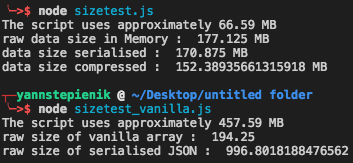memory-efficient-object
v0.4.1
Published
Memory efficient implementation of objects / arrays for bits and bytes mainpulation (int, char, uint, ...) in JS, using schema for serialisation
Downloads
2
Readme
Introduction
this package is a very light (no dependencies) module to drastically optimise the usage of memory in data-driven application. Using basic objects/arrays in JS is very sub-optimal, and typed array often fail to fit people's needs. Also, using JSON to serialise your data leads to major bottleneck in disk / memory / network usage. This library cater for this problem by providing an implementation of an array with bit-per-bit optimisation of your memory usage.

Exemple spawning 65536 arrays of 128 int of variable size in JS.
tests are available :
npm run testUsage
npm install memory-efficient-objectExample of usage :
const {schemaEngine, MEObject} = require('memory-efficient-object');
const schema = {
"id" : "uint(2)",
"letter" : "char",
"isBlue" : "bool",
"size" : "uint(32)",
"x" : "int(32)",
"name" : "string(4)",
"coords" : "uint(8)[3]",
"lights" : "bool[3]"
};
let testSchema = schemaEngine.add(schema);
// 2nd argument optional values
let test = new MEObject(testSchema, {
id: 3,
letter: 'A',
isBlue: true,
size: 4294967295,
x: -5000,
name: 'Yann',
coords: [ 1, 2, 3 ],
lights: [ true, false, true ]
});
// ...set some values
// ....
console.log(test.toJson());
/*
Will display :
{ id: 3,
letter: 'A',
isBlue: true,
size: 4294967295,
x: -5000,
name: 'Yann',
coords: [ 1, 2, 3 ],
lights: [ true, false, true ] }
*/
console.log(test.serialize());
/*
Will display: ǿ↓硙慮渁ȃԀ
As you can appreciate, this is a much smaller string (10 char vs. 150).
*/
// serialize then unserialize
let testUnSerialised = new MEObject(testSchema, test.serialize());
console.log(testUnSerialised.toJson());
// will re-display the same JSON object again after unserialization
More details :
const {schemaEngine, MEObject} = require('memory-efficient-object');
// Define your schema
const schema = {
"id" : "uint(2)"
};
// This add it to the schema engine which compiles it and keeps it
let testSchema = schemaEngine.add(schema);
// Create an Object using this schema
let test = new MEObject(testSchema);
// set a value
test.set("id", 1)
// get a value
test.get("id")
Schema Definition
Available datatypes
| Name | description | length | | ------------- |:-------------: | -----:| | bit | simply a bit | 1 | | bool | Same than bit, but will accept / return true/false instead of 0/1 automatically | 1 | | char | Same than uint(8), but will accept / return a character automatically | 8 | | uint(n) | Unsigned Int of size n | n | | int(n) | signed Int of size n | n | | string(n) | string of size n | n * 8 |
use arrays
const {schemaEngine, MEObject} = require('../index');
const schema = {
"coords" : "uint(8)[3]",
};
let testSchema = schemaEngine.add(schema);
let test = new MEObject(testSchema);
test.set("coords", [1,2,3]);
test.get("coords"); // [1,2,3]
test.get("coords", 1); // 2Note on usage
Choose your datatypes very carefully, using as few bytes as you can, this is the key to optimising your app !
The serialised output of this library is compression friendly, bare in mind that until defragmentation is implemented, only dataset with bigger datatypes will benefit from it.
ToDo
- fill gaps between values dynamically

